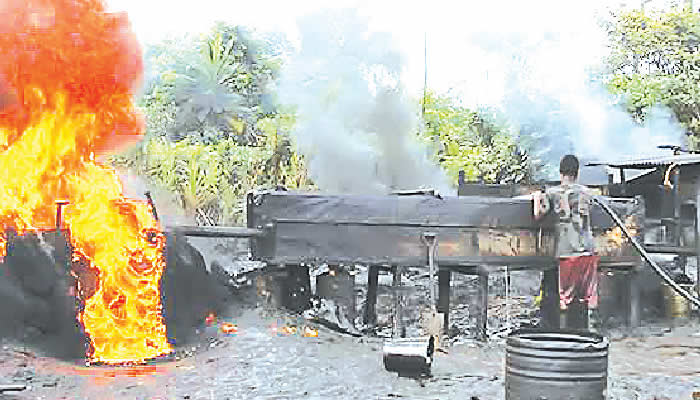Crime
Oil Companies Patronise illegal Refineries, Tantita Security Alleges

|
Getting your Trinity Audio player ready...
|
Oil companies patronise illegal refineries, Tantita Security alleges
By Chioma Chibuzo
Oil companies buy refined Automotive Gas Oil, popularly called diesel, from illegal refineries in various host communities in the Niger Delta region, Tantita Security Services Nigeria Limited allegedly declared on Monday.
It declared this in the presence of international and domestic oil and gas companies at the ongoing Nigeria Oil and Gas Energy Week Conference holding in Abuja. This was not contested by the oil firms present at the event.
Tantita is a security company headquartered in Warri, Delta State, focusing on the oil and gas sector, and offers security solutions specifically designed for oil and gas assets. The firm currently offers security services to the Nigerian National Petroleum Company Limited.
Speaking as a panellist at the session titled, “Exploring Nigerian Content Solutions to Meet Energy Demand,” the Executive Director, Operations and Technical, Tantita Security Services, Capt. Warredi Enisuoh said illegal refineries produce diesel in large volumes and their customers include many downstream operators.
He said the outfits get patronage from not just smugglers, but also from oil companies, stressing that the clampdown of these refineries by Tantita and other security agencies was the reason why diesel prices had been on the increase.
“Why is there no scarcity of diesel while there is scarcity of PMS (Premium Motor Spirit, popularly called petrol)? The story is simple, most of the diesel you buy is produced by the communities.
“About 90 per cent of the diesel in the fuel stations is produced by the communities. It will also interest you to know that even the oil companies patronise the local communities. Don’t let anybody deceive you, they (oil companies) also patronise the local communities,” he declared.
Enisuoh explained that to provide Nigerian content solutions to meet energy demand, concerning infrastructure, “we might need to focus more on the local communities.”
He insisted that if not for the interventions of security agencies such as his firm, the production of diesel illegally would continue to increase.
“The reason why the price of diesel is high today is because of the works of private security companies like my company Tantita Security Services.
“This is because we have been able to somehow cut down on a lot of the businesses of the illegal refineries. This is why you see the cost of diesel going up,” he stated.
On April 10, 2024, The PUNCH reported that NNPC declared that a tugboat conveying suspected illegally refined diesel was apprehended by operatives of Tantita Security Services Limited.
NNPCL had stated that the tugboat was being escorted by a marine police boat in Rivers State before it was arrested by the security outfit, adding that five persons on the boat were currently being interrogated by Tantita.
“On Monday, April 1, 2024, the Tantita Security Services team on patrol pursued and arrested a tugboat – Aya Oba Olori II, which was being escorted by a marine police boat in Rivers State.
“The tugboat was laden with an unspecified quantity of suspected illegally refined AGO which was loaded from a barge at Onne dock on March 31. Five persons onboard the tugboat were arrested by Tantita team and are undergoing interrogation,” NNPC had stated.
In another development on the sidelines of the NOG conference, the Chief Executive, Nigerian Upstream Petroleum Regulatory Commission, Gbenga Komolafe, led Nigeria’s delegation in a meeting with the African Petroleum Regulators Forum.
He said members of the forum, comprising regulators from various countries on the continent, would work together to harness and judiciously utilise the 125 billion barrels of crude oil reserves in Africa.
He said, “Today marks a significant milestone in our collective journey towards fostering a more collaborative, innovative, and sustainable petroleum industry in Africa.
“The establishment of the AFRIPERF signifies our commitment to working together to overcome common challenges and seize the opportunities that lie ahead so that we can achieve our national aspirations in the development and utilisation of our hydrocarbon resources.
“Currently, Africa holds substantial oil and gas reserves. The continent’s proven oil reserves are estimated to be around 125 billion barrels, representing approximately seven to nine per cent of the world’s total oil reserves, while the proven natural gas reserves are estimated at around 620 trillion cubic feet, which is about seven to eight per cent of the global total (Mondaq),” Komolafe stated.
He noted that aside from hydrocarbon resources, Africa is blessed with potential for green and blue hydrogen, solar, wind, biomass and critical minerals for the development of clean energy technologies as well as a growing population predominated by young people representing a huge economic asset.








